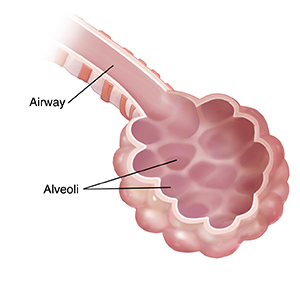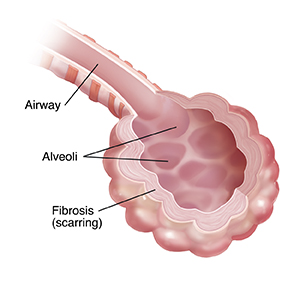Idiopathic Pulmonary Fibrosis (IPF)
What is idiopathic pulmonary fibrosis?
Idiopathic pulmonary fibrosis (IPF) is a type of interstitial lung disease. Interstitial lung diseases are a group of conditions that cause inflammation and scarring around the tiny air sacs (alveoli) in the lungs. The scarring is called fibrosis. It causes the tissues in the lungs to get thick and stiff. This makes it hard to take in oxygen. Idiopathic means an unknown cause. Often, the cause of IPF isn't known. IPF is a long-term (chronic) disease.
 |
| Healthy alveoli. |
 |
| Alveoli with fibrosis. |
What causes idiopathic pulmonary fibrosis?
Most of the time, healthcare providers don’t know what causes lung tissue to become thick and stiff and form scarring in the lungs. Things that can increase your risk of getting IPF are:
-
Being older (risk increases after age 50)
-
Smoking
-
Being male
-
Certain viral or bacterial infections
-
Long periods of exposure to asbestos fibers, pollution, silica, grain or metal dusts, bacteria, radiation, bird droppings, and gases
-
Certain cancer treatments
-
Certain types of heart medicines or antibiotics
-
Family history (genetics). More than one family member may have pulmonary fibrosis.
-
Gastroesophageal reflux disease (GERD). Researchers are trying to find the link between GERD and IPF.
What are the symptoms of idiopathic pulmonary fibrosis?
Symptoms of IPF include:
-
Trouble breathing or shortness of breath, especially during exercise
-
Long-term (chronic) dry, hacking cough
-
Chest pain
-
Widening and rounding of the tips of fingers or toes (clubbing)
-
Slow, unintended weight loss or loss of appetite
-
Fast, shallow breathing
-
Feeling tired and weak
-
Joint and muscle pain
How is idiopathic pulmonary fibrosis diagnosed?
Your healthcare provider will ask about your health history and current symptoms. They will do a physical exam. You may need diagnostic tests. These may include a chest X-ray, a CT scan of the lungs, and blood tests. Other tests may include:
-
Lung function tests. These tests find out how well your lungs work. A common test is spirometry.
-
Bronchoalveolar lavage (BAL). This test looks at cells from your lungs. It's done during a bronchoscopy. A bronchoscope is a special tool that lets your healthcare provider see inside your lungs. They can also use it to take small samples of tissue for testing. During BAL, a small amount of sterile fluid is put into the lungs through the bronchoscope and then suctioned out. The fluid that is suctioned out contains cells that are then examined.
-
Lung biopsy. A small sample of lung tissue is taken and then looked at under a microscope. A biopsy is done during bronchoscopy or a surgical procedure.
-
Exercise testing. These tests show how well your lungs work during exercise.
How is idiopathic pulmonary fibrosis treated?
Pulmonary fibrosis can’t be cured. Treatment can help control the disease and improve symptoms. Your healthcare provider will talk about possible treatments with you. These can include:
-
Medicines. These can help reduce inflammation in the lungs. They also can suppress your body’s immune system and help lessen scarring.
-
Supplemental oxygen. This can help more oxygen get into your blood. Some people will need to use oxygen all the time. Others will only need it when they sleep or exercise.
-
Breathing methods. These can help you cope with shortness of breath.
-
Pulmonary rehabilitation. This is a program of exercise and education that can help you gain strength and independence.
-
Lung transplant. For certain people with advanced pulmonary fibrosis, a lung transplant can be considered.
-
Lifestyle changes. Your provider may suggest quit smoking programs and certain changes in your diet and exercise plan.
Online Medical Reviewer:
Chris Southard RN
Online Medical Reviewer:
Marianne Fraser MSN RN
Online Medical Reviewer:
Sravani Chintapalli
Date Last Reviewed:
3/1/2024
© 2000-2026 The StayWell Company, LLC. All rights reserved. This information is not intended as a substitute for professional medical care. Always follow your healthcare professional's instructions.